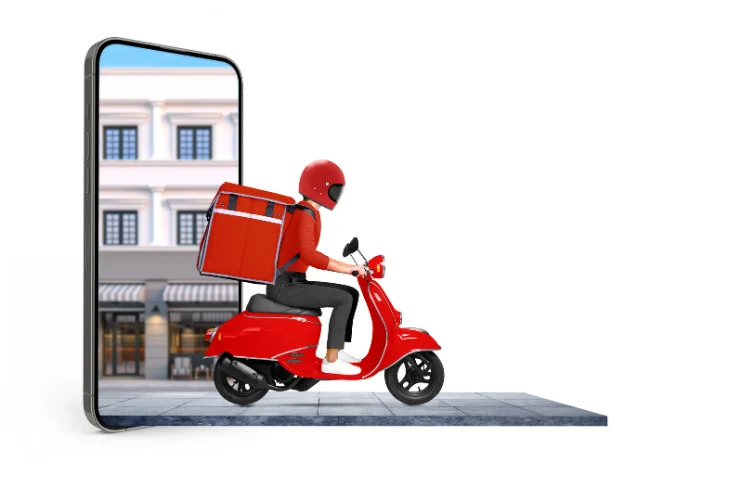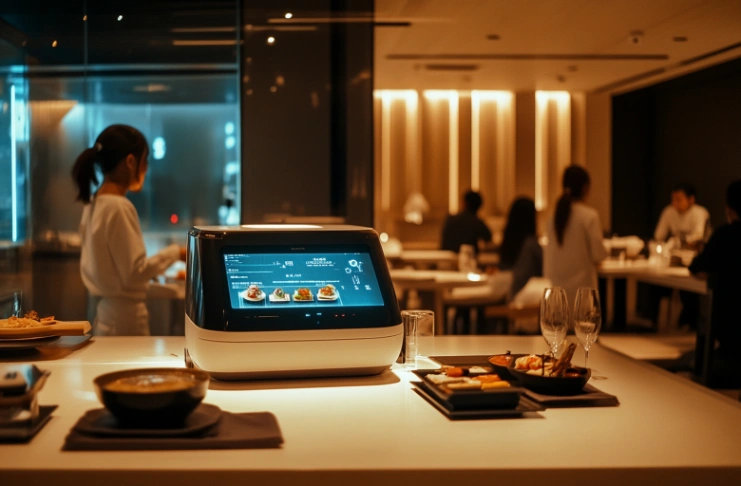In the heart of the UAE’s culinary landscape, a silent revolution is taking place. As Emiratis and expats alike reach for their smartphones instead of their car keys when hunger strikes, cloud kitchen ventures in Abu Dhabi are transforming how the capital experiences food.
Gone are the days when prime restaurant locations and traditional restaurant setups determined success. Today, in the shadow of the Corniche’s gleaming towers and Yas Island’s entertainment hubs, talented chefs and savvy entrepreneurs are creating culinary magic from streamlined, delivery-only operations that prioritize flavor over physical footprint.
The UAE’s digital food scene is uniquely positioned for this transformation. With one of the world’s highest smartphone penetration rates and a cosmopolitan population accustomed to convenience, Abu Dhabi’s cloud kitchens are meeting a demand that grows more insatiable by the day, presenting opportunities for a successful food delivery business.
From traditional Emirati cuisine reimagined for the delivery era to international fusion concepts that would never find enough foot traffic in conventional locations, these virtual restaurants are writing a new chapter in the Emirates’ rich culinary story.
Whether you’re considering launching your own cloud kitchen in Abu Dhabi or are simply curious about the forces reshaping the capital’s food landscape, join us as we explore how this innovative business model is perfectly aligned with the UAE’s vision of technological advancement and entrepreneurial spirit.
What is a Cloud Kitchen?

A cloud kitchen, also known as a ghost kitchen or dark kitchen, is a delivery-only restaurant that operates without a physical dine-in location. A cloud kitchen setup leverages online platforms for food ordering and delivery.
This model allows entrepreneurs to focus entirely on food production, eliminating the overheads associated with front-of-house operations like waitstaff, dining furniture, and high-street rents. Cloud kitchens typically operate out of shared commercial spaces or dedicated facilities designed for cooking and dispatching food quickly and efficiently. In a rapidly digitizing food ecosystem, cloud kitchens represent the next generation of restaurant entrepreneurship.
Why Choose Abu Dhabi for Your Cloud Kitchen?
Abu Dhabi offers a unique blend of high disposable incomes, a growing young population, and increasing demand for online food delivery services.
The city’s infrastructure is built for seamless logistics and last-mile delivery. Its strategic location within the UAE also gives access to customers in satellite cities and regions, increasing delivery range. Moreover, Abu Dhabi’s Vision 2030 promotes digital innovation and entrepreneurship, which aligns perfectly with the cloud kitchen model. Combined with low startup costs and modern industrial zones, Abu Dhabi presents an ideal ecosystem for launching a profitable virtual food business.
Cloud Kitchen Abu Dhabi vs. Cloud Kitchen Dubai

Deciding between Abu Dhabi and Dubai for your cloud kitchen depends on your business goals, operational preferences, and target demographics. Each city offers a distinctive landscape that can benefit your virtual restaurant in different ways.
Dubai is often perceived as the commercial heartbeat of the UAE, offering a dense, cosmopolitan population, massive tourist influx, and a dynamic culinary scene. The city’s high consumer demand and tech-savvy population make it a thriving marketplace for delivery-only kitchens. However, this comes with high rental costs and steep competition.
On the other hand, Abu Dhabi provides a more stable residential customer base and relatively lower setup and operational costs. It’s ideal for brands looking to build long-term loyalty in a less saturated market. Additionally, the Abu Dhabi government offers targeted support for foodpreneurs and digital businesses, making it appealing for startups and solo founders.
Whether you prioritize volume and exposure (Dubai) or loyalty and affordability (Abu Dhabi), aligning your strategy with the city’s core strengths will maximize your growth potential.
Understanding these differences helps you decide where to launch and how to position your brand for long-term success.
Market Demand in the UAE
The UAE’s online food delivery market is experiencing significant growth. According to Mordor Intelligence, the global online food delivery market is projected to grow from USD 0.78 trillion in 2025 to USD 1.57 trillion by 2030, at a compound annual growth rate (CAGR) of 15.01%. This growth is driven by factors such as increasing smartphone penetration, a tech-savvy population, and lifestyle shifts favoring convenience and variety. These trends present a significant opportunity for new and niche food brands to scale quickly in a delivery-only format.
INDUSTRY INSIGHTS
| The UAE’s cloud kitchen market has experienced remarkable growth. In 2023, it was valued at approximately $275 million and is projected to grow annually by 25.17% from 2024 to 2030. This surge is driven by the convenience of online food delivery and advancements in technology that have made ordering food more accessible. |
Benefits of Setting Up a Cloud Kitchen in Abu Dhabi

Operating a cloud kitchen in Abu Dhabi comes with multiple advantages:
- Low overhead costs: No dine-in setup required, reducing CAPEX.
- Speed to market: Faster licensing and infrastructure setup.
- Operational flexibility: Ability to pivot concepts or menus based on real-time feedback.
- Scalable model: Expandable to other Emirates with minimal adjustments.
These benefits enable faster breakeven and long-term profitability, especially for first-time entrepreneurs and digital food brands.
Popular Cuisine Trends in the UAE

Food trends in the UAE are shaped by its multicultural demographic and growing awareness around wellness and sustainability. Some high-performing categories include:
- Health-conscious options: Vegan, keto, gluten-free
- Asian fusion and street food: Sushi burritos, bao buns, ramen
- Desi comfort food: North Indian thalis, biryani combos
- Indulgent fast food: Burgers, loaded fries, specialty wings
These cuisines have proven to generate high order volumes on aggregator platforms and are perfectly suited to the cloud kitchen format.
Regulatory Requirements

To legally set up a cloud kitchen, you’ll need approvals from:
- Abu Dhabi Department of Economic Development (ADDED): For trade license and economic activity registration
- Abu Dhabi Agriculture and Food Safety Authority (ADAFSA): For hygiene and food safety compliance
- Local municipality: For structural, fire safety, and zoning permits
Meeting these requirements ensures operational transparency and builds consumer trust through legal compliance.
Trade License & Permits
Operating a cloud kitchen requires:
- Commercial trade license: Typically under the “Restaurant and Delivery Services” category
- Food safety certificate: From ADAFSA for hygiene protocols
- Tenancy contract or Ejari: As proof of commercial kitchen space
Adhere to the UAE’s food safety regulations, including obtaining HACCP certification and following the UAE.S GSO 1694/2016 guidelines for food hygiene. Regular staff training and kitchen audits will help maintain high standards.
These permits can be obtained via the TAMM portal, which streamlines government services in Abu Dhabi, often enabling approvals within days if documentation is complete.
Approved Kitchen Facilities & Locations
Strategically located kitchen hubs can reduce delivery time and increase order volume. Considering your business structure, top areas include:
- Mussafah Industrial Area: Cost-effective with access to central Abu Dhabi
- Khalifa City: Near affluent residential areas and universities
- ICAD Industrial Zone: Ideal for multi-brand kitchens and logistics access
You can also explore platforms like Kitopi or The Cloud, which provide plug-and-play kitchen infrastructure with backend support.
Cost of Starting a Cloud Kitchen in Abu Dhabi

Typical startup costs include:
- Licensing and registration: AED 10,000–20,000
- Kitchen rent (shared): AED 5,000–15,000/month
- Equipment and branding: AED 20,000–50,000
- Marketing and launch: AED 10,000–25,000
Costs can be optimized by using co-kitchen models, leasing equipment, and opting for digital marketing over traditional ads.
Choosing the Right Delivery Aggregators

Food delivery aggregators play a major role in driving visibility and sales. Consider:
- Talabat: High market share, good for fast food and mid-range brands
- Deliveroo: Premium customers and user-friendly interface
- Noon Food: Low commission rates and fast growing
Negotiate commissions, listing fees, and promotion options for maximum return on investment.
Logistics and Delivery Partners
Aside from aggregator drivers, consider outsourcing logistics to:
- Quiqup: On-demand delivery with real-time tracking
- Shipa Delivery: Reliable for inter-city food deliveries
- Fetchr: Popular in residential zones and business hubs
Timely, hygienic deliveries are crucial for retaining your customer base.
Top Cloud Kitchen Operators in the UAE
Several top-tier players dominate the UAE’s cloud kitchen scene:
- Kitopi: Operates multi-brand cloud kitchens across the region
- The Cloud: Specializes in turning underutilized kitchens into profit centers
- KRUSH Brands: Integrates tech and food concepts seamlessly
Partnering with these platforms can reduce startup hassle and accelerate growth.
Cloud Kitchen Dubai Trends to Watch
While setting up in Abu Dhabi, keeping an eye on Dubai’s trends can give you a competitive edge:
- Influencer-led food brands: Celebrity kitchens gaining traction
- Multi-brand operations: Kitchens housing 5–10 brands for efficiency
- Tech-powered kitchens: AI menus, predictive ordering, and robotics
Adopting these innovations early can set your business apart in the Abu Dhabi market.
Marketing Your Virtual Restaurant in the UAE

Build a strong brand identity with:
- Search Engine Optimization (SEO): Rank on Google for food terms
- Social media marketing: Leverage Instagram Reels and TikTok trends
- Influencer partnerships: UAE food bloggers drive massive engagement
- Aggregator promotions: Boost visibility with in-app offers
A consistent digital presence fosters recognition and trust among potential customers.
Tech Stack You’ll Need

Running cloud kitchen operations effectively requires tech infrastructure:
- POS system: Syncs orders from all platforms
- Inventory management software: Reduces food wastage
- CRM tools: Builds loyalty via targeted campaigns
- Analytics dashboard: Tracks customer behavior and sales
A well-integrated tech stack boosts efficiency and scalability.
Sustainability Trends in UAE’s F&B Sector
Sustainability is a rising priority across the UAE. Cloud kitchens can align with:
- Using compostable or recyclable packaging
- Minimizing food waste with smart inventory
- Partnering with eco-conscious suppliers
Such practices not only reduce operational impact but also attract eco-aware consumers.
Government Support for Foodpreneurs

Government entities actively support digital F&B ventures:
- Hub71: Startup ecosystem offering funding, mentorship, and office space
- Dubai SME: Training and financial grants for small businesses
- ADIO (Abu Dhabi Investment Office): Incentives for innovation-driven startups
Tapping into these programs can significantly boost your resources and visibility.
Resources for Entrepreneurs

Several UAE-based initiatives support food and tech entrepreneurs:
- Khalifa Fund: Provides funding and mentorship to local SMEs
- TASMU Digital Valley: Supports AI and tech-powered solutions in F&B
- Sharjah Foodtech Valley: Hub for agri-tech and food innovation startups
These resources offer technical expertise, funding, and collaborative space to test, scale, and build a thriving cloud kitchen business.
Challenges & Solutions
Running a cloud kitchen in the UAE is a lucrative yet competitive venture. Here are some common challenges and actionable solutions:
- High aggregator commissions: Third-party delivery apps often charge commissions of up to 30%, which can erode profit margins. To counter this, build a branded website or app for direct ordering and offer exclusive loyalty programs or discounts to encourage repeat purchases without aggregator costs.
- Food quality control: Ensuring consistency in food taste, presentation, and hygiene across multiple orders can be difficult. Implement standard operating procedures (SOPs), automated kitchen timers, and invest in ongoing staff training to maintain quality standards at scale.
- Menu fatigue: Customers may grow bored with static menus. Innovate regularly by launching seasonal items, limited-time offers, or rotating specials. This keeps your offerings fresh and encourages customer retention.
By staying agile and responsive to these operational hurdles, your cloud kitchen will be better positioned for sustained success in the evolving UAE market.
Conclusion
Abu Dhabi is rapidly emerging as the Middle East’s cloud kitchen epicenter. For a startup cloud kitchen, the emirate’s strategic economic zones, cutting-edge digital infrastructure, and government-backed entrepreneurial incentives create the perfect ecosystem for delivery-only food concepts to thrive.
With blazing-fast 5G networks and sophisticated delivery systems serving a tech-savvy, multicultural population, the capital offers cloud kitchen operators unparalleled advantages. From specialized licensing frameworks to reduced overhead costs, Abu Dhabi provides a unique launching pad for culinary entrepreneurs.
The city’s diverse residents—blending Emirati traditions with global influences—represent an ideal testing ground for innovative food concepts without the financial risks of conventional restaurants. As digital dining becomes increasingly embedded in UAE culture, Abu Dhabi stands poised to lead the region’s virtual restaurant revolution. So, what are you waiting for? Start your journey today!
Frequently Asked Questions
1. Is cloud kitchen allowed in Abu Dhabi?
Yes, cloud kitchens are legally allowed and actively supported in Abu Dhabi with proper licenses and food safety approvals.
2. How much does a cloud kitchen cost in Dubai?
Starting a cloud kitchen in Dubai typically costs between AED 50,000 and AED 150,000, depending on scale and location.
3. What are the cloud kitchen brands in the UAE?
Major cloud kitchen brands in the UAE include Kitopi, The Cloud, KRUSH Brands, and Sweetheart Kitchen.
4. What is the cloud kitchen concept?
A cloud kitchen is a delivery-only restaurant that operates without a dine-in facility, focusing solely on online food orders.
5. Is cloud kitchen profitable in Dubai?
Yes, with strategic operations and marketing, cloud kitchens can be highly profitable in Dubai due to low overheads and high demand.
6. How many Cloud Kitchens are there in Dubai?
While the exact number is not publicly disclosed, Dubai hosts hundreds of cloud kitchens operated by both local startups and global players.
7. What is a cloud kitchen concept?
It’s a virtual restaurant model where food is prepared for delivery only, without a physical storefront or dine-in area.
8. How many cloud kitchens are there in Dubai?
Estimates suggest there are over 400 cloud kitchens operating in Dubai as of recent industry data.
9. How much is Hells kitchen in Dubai?
A meal at Hell’s Kitchen Dubai typically costs between AED 300 and AED 600 per person, depending on your order.





